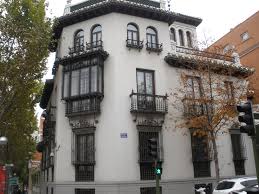Interview with Belen Sánchez, Communications Director of the Elcano Royal Institute.

The facade of the Elcano Royal Institute
The Elcano Royal Institute was estalished in December 2001. It is a think tank specilizing in international relations and foreign policy. According to the 2012 Global Go-To Think Tank Rankings, the institute ranked number one in Spain and was in the top 40 security and international relations think tanks in the world. Belen Sánchez, communications director of the Elcano Royal Institute, answered questions to elaborate on the operation of Elcano.
CSST: What was the founding mission for the Elcano Royal Institute?
Sánchez: The Elcano Royal Institute was established in December 2001 under the Honorary Presidency of His Royal Highness the Prince of Asturias (Prince Felipe). It is a think tank specializing in international relations and foreign policy. Our output is intended to be useful for the decision-making of both public and private Spanish agencies which are working internationally. Its goal is to provide a forum for analysis and discussion of the current international situation, particularly for Spain’s foreign relations.
CSST: How is the institute organized? What would you say is the most important work the institute does?
Sánchez: The main governing bodies of the Institute include the board of trustees, which is the senior body of the institute, the cxecutive committee, which acts on behalf of the board, the president, Emilio Lamo de Espinosa, and the director, Charles Powell; non-executive bodies include the Business Advisory Council, Scientific Council and Media Committee.
Its staff of researchers covers 14 areas. Geographically, they mainly focus on Europe, Latin America, the Mediterranean and Arab world, Asia-Pacific, the U.S.-Transatlantic Dialogue, and sub-Saharan Africa. Thematically, they cover Foreign Policy, Economics and International Trade, International Cooperation and Development, Energy, Security and Defense, International Terrorism, Spain’s International Image and Public Opinion, Language and Culture, and Demography, Population and International Migration.
Also, the nature of the Elcano Royal Institute’s work is transversal and multidisciplinary. This year the Institute has focused its attention on three programs, Spain: Responses to the Financial and Economic Crisis, the Global Presence of Spain, and Europe in the World. Our output is is very extensive and falls into a few different categories based on product. The two largest ones are the Working Documents(Documentos de Trabajo), and the Elcano Royal Institute Analysis (Análisis Real Instituto Elcano). In addition, we publish Elcano Reports, Elcano Studies, yearbooks, monographs, books and reviews. Some of them have periodicity, such as the Elcano Latin American Yearbook and the Asia-Pacific Yearbook, which we co-edit with two other Spanish think tanks, Casa Asia and CIDOB (Barcelona Centre for International Affairs). Our entire catalogue is published on our website and made available to Spanish and international society at large.
CSST: What is the institute’s relationship with the Spanish government? Spain is currently in a very complicated situation. What kind of influence do you think the institute’s views and publication have on government decision-making? How does it guarantee that its research remain independent and non-partisan?
Sánchez: The Elcano Royal Institute is a private, non-partisan institution. In addition to being composed of 18 different companies, our board also includes members of the two main political parties in Spain, the Popular Party (PP) and the Spanish Socialist Workers’ Party (PSOE). While we are financed by the Spanish government through 4 different ministries (Foreign Affairs and Cooperation, Defense, Economy and Competition, and Education, Culture and Sport), this accounts for less than 25% of the institute’s total funding. The remaining 75% comes from the Spanish companies that form the Board.
The Board of the Institute and its main governing body is made up by former Prime Minister Felipe González who is the member of the PSOE; the ministers of the ministries mentioned above which belong to the PP; the presidents of the companies contributing to its financing; a sponsor appointed by the main opposition party, which now is the PSOE; and past presidents and directors.
Therefore, thanks to the bipartisan composition the institute’s governing body, its independence is fully guaranteed. Moreover, the Elcano Royal Institute is not responsible for the opinions and data in its publications—this information is the sole responsibility of the authors.
CSST: Do you have any projects focusing on China?
Sánchez: Within the Asia-Pacific area, China is one of the countries to which the Elcano Real Institute has always devoted great attention. Among our most recent publications, some works highlight the 18th National Congress of the Communist Party of China.
CSST: What other information or opinions about the Institute do you want to share with our readers?
Sánchez: In addition to the publications mentioned above, there are the two important studies conducted by the Institute. The first is the Barometer of the Elcano Royal Institute (BRIE),a triannual survey on the opinions of the Spanish public toward Spain’s international relations and foreign policy. So far, there have been 32 waves of this survey, with significant impact on the media both nationally and internationally.
The other is the Elcano Global Presence Index (IEPG), which measures the foreign presence (or the internationalization) of the most developed societies according to 5 indicators: economy, defense and security, migration and tourism, science and culture, and development aid. In 2013 it will launch the 3rd edition of IEPG, which will expand to include several new features, including a global presence index for Europe, an index for other countries, including the UAE, Egypt, Singapore, the Philippines, Pakistan and Algeria, and a supplement called “Bioplarity or Multipolarity?”.
Lastly, it should be noted that according to the 2012 Global Go To Think Thank Rankings, the institute ranked number one in Spain and was in the top 40 security and international relations think tanks in the world.
Translated by Yang Lu
The Chinese version appeared in Chinese Social Sciences Today, No. 445, May 3, 2013.
